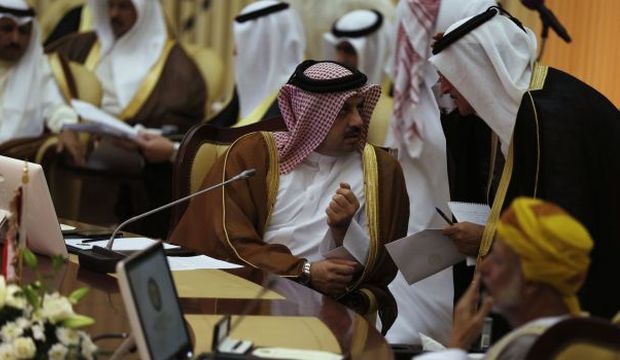
Qatar’s Foreign Minister Khalid Bin Mohammed Al-Attiyah (L) attends a Gulf Cooperation Council (GCC) meeting in Riyadh, Saudi Arabia on June 2, 2014. (Reuters/Faisal Al Nasser)
Jeddah and Kuwait City, Asharq Al-Awsat—Diplomatic tensions between Saudi Arabia, Bahrain and the UAE on one side, and Qatar on the other, have increased despite attempts by Kuwait and Oman to mediate between the two sides, sources say.
Gulf sources told Asharq Al-Awsat there were still differences between the two sides in the wake of the completion of a report from the committee charged with examining Qatar’s compliance with a deal designed to patch up the dispute between Doha and its neighbors.
The three Gulf countries accuse Qatar of failing to respect principles of mutual respect and non-interference in the internal affairs of other Gulf states by backing groups which endanger their security.
Saudi Arabia, Bahrain and the UAE recalled their ambassadors from Doha in March in protest at Qatar’s policies, which they said contravened the founding charter of the Gulf Cooperation Council (GCC), of which they are all members.
Following Kuwaiti mediation, the four countries reached an accord in Riyadh in April, and set up a committee to oversee its implementation. The committee submitted its final report last week, which Qatar refused to endorse, according to a senior Gulf official who spoke to Asharq Al-Awsat on condition of anonymity.
A deadline set by the other three states for Qatar to comply with the April agreement has now expired, though a Gulf source, speaking on condition of anonymity, said Doha had proposed rescheduling talks on the issues in dispute in exchange for the return of the ambassadors of its three neighbors.
Reports said a consultative meeting would be held on Jeddah on Saturday to discuss the issue and Qatar’s proposal.
Qatar has also reduced its diplomatic presence in Riyadh and Jeddah, although the country’s ambassador to Saudi Arabia, Sheikh Abdullah Bin Thamir Al Thani, claimed he was on vacation and that he would accompany Foreign Minister Khalid Bin Mohammed Al-Attiyah to Jeddah to attend the Gulf foreign ministers’ meeting scheduled to take place on Saturday.
Meanwhile, a Kuwaiti diplomat told Asharq Al-Awsat that Kuwait and Oman were still attempting to mediate between the other four members of the GCC.
The diplomat, who spoke on condition of anonymity, said a report would be sent to the upcoming Jeddah meeting on the issues surrounding the dispute with Qatar.
He added: “We are following the situation closely even if we are not participating in the meeting, but we are concerned with the outcome as Kuwait is leading the mediation efforts between all parties as the president of the current GCC session, and is doing its best to bring the views closer and end this internal Gulf conflict.”
The diplomatic source added: “We expect good results and we will continue in our mediation efforts with all the parties, and we are receiving support from the Sultan of Oman, who is trying to achieve reconciliation between the parties.”
The diplomat told Asharq Al-Awsat that a decisive meeting will be held on the fringes of the regular meeting of the Gulf states on Saturday, and there were hopes that a resolution of the dispute would be reflected in the summit’s concluding statement.
Reem Al-Mayea contributed additional reporting from Kuwait City.

Trackbacks/Pingbacks